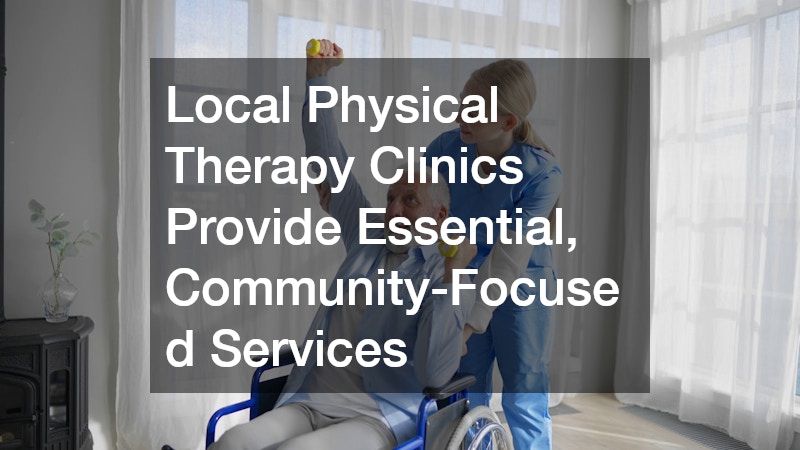Top Services Offered by Local Physical Therapy Rehab Clinics
Local physical therapy rehab clinics play a vital role in helping individuals recover from injuries, manage chronic conditions, and improve overall physical well-being. Whether you’re an athlete recovering from a sports-related injury, an older adult seeking improved mobility, or someone managing post-surgical rehabilitation, these clinics provide a range of targeted services tailored to your unique needs. Their commitment to personalized care and evidence-based practices ensures that each patient receives a comprehensive and effective treatment plan.
In this article, we explore the top services offered by local physical therapy rehab clinics, shedding light on how they support recovery, enhance mobility, and promote long-term health. By understanding these core offerings, patients can take confident steps toward achieving better function and a higher quality of life.
What are the most common physical therapy services available?
Manual Therapy Techniques
Manual therapy encompasses a variety of hands-on techniques used by physical therapists to assess and treat musculoskeletal pain and movement impairments. It focuses on mobilizing joints, manipulating soft tissues, and stretching muscles to improve circulation, enhance range of motion, and restore functional movement. Techniques commonly employed include joint mobilization, soft tissue mobilization, trigger point therapy, and passive stretching.
Therapists use their clinical expertise to apply precise amounts of pressure and movement based on the patient’s condition and tolerance. These techniques are especially beneficial for patients experiencing joint stiffness, muscle tightness, or pain due to injury, postural issues, or chronic conditions such as arthritis and fibromyalgia. By directly addressing restrictions in the muscles and fascia, manual therapy can alleviate discomfort, improve alignment, and accelerate the healing process.
Beyond relieving pain, manual therapy is essential in retraining the body’s natural movement patterns. It lays the groundwork for more active rehabilitation strategies, such as therapeutic exercise, by preparing the body to move more freely and efficiently. This approach empowers patients to regain confidence in their mobility and supports long-term functional independence.
Therapeutic Exercise Programs
These programs are designed to strengthen muscles, improve flexibility, and restore balance, tailored to individual patient needs. With personalized exercises, patients can achieve better health outcomes.
Therapists focus on crafting detailed exercise regimens, considering current fitness levels and any constraints due to injuries. By doing so, they ensure a safe yet progressive approach to rehabilitation.
Engaging in therapeutic exercises helps boost overall endurance and capacity for physical activities. It provides a foundation for patients to remain active and prevent potential future injuries.
How do clinics address sports injuries and rehabilitation?
Sports-Specific Training
Clinics offer specialized training that focuses on the particular movements and demands of different sports to aid recovery. This approach ensures athletes receive targeted care that directly appeals to their athletic needs.
Sports-specific training often involves re-educating the body with exercises tailored to the sport’s unique demands. This not only aids recovery but also boosts performance once the athlete returns to the field.
By simulating actual game situations, these training programs help athletes rebuild confidence and minimize injury recurrence. It’s crucial for both amateur and professional athletes looking for comprehensive recovery.
Customized Recovery Plans
Physical therapists develop individualized recovery plans that address specific injuries, helping athletes safely return to their sport. These plans are rooted in a thorough assessment of the athlete’s current condition.
The integration of modern technology and diagnostic tools aids therapists in creating effective recovery pathways. By doing so, they target enhanced healing and optimal return to performance.
Continuous monitoring and adjustments in the recovery plan ensure athletes’ progress without setbacks. This dynamic approach is imperative, especially in high-demand sports scenarios.
What specialized therapies do clinics offer for chronic pain management?
Myofascial Release Therapy
This therapy targets the myofascial tissues, relieving tension and pain by improving blood flow and tissue relaxation. It can notably help individuals suffering from persistent pain caused by restricted fascia.
Skilled therapists use manual pressure to stretch and release the fascia, encouraging better circulation. This method helps in reducing muscular tension, which might contribute to chronic pain conditions.
Myofascial release therapy not only targets pain reduction but also improves overall body function. Patients often observe a boost in mobility and reduced discomfort in their daily routines.
Electrotherapy Modalities
Electrotherapy uses electrical impulses to reduce pain and stimulate muscle contraction and healing processes. Devices such as TENS units are popular for delivering this non-invasive treatment.
This therapy is especially beneficial for patients dealing with chronic pain, post-surgery recovery, or muscle spasms. By altering pain signal transmission, electrotherapy facilitates prolonged relief from discomfort.
Incorporating electrotherapy into treatment plans can enhance muscle strength and promote faster rehabilitation. Patients often experience a marked improvement in their ability to perform daily activities.
Local physical therapy rehab clinics offer an indispensable set of services designed to meet the diverse needs of their communities. From manual therapy and therapeutic exercises to advanced modalities like electrotherapy and myofascial release, these clinics deliver holistic, patient-focused care that accelerates recovery and reduces long-term pain. Their expertise extends beyond treating acute injuries, encompassing chronic pain management, post-surgical rehabilitation, and sport-specific recovery plans. By choosing a local rehab clinic, patients not only benefit from convenience but also gain access to a team of dedicated professionals invested in their health journey. With the right support, anyone can regain strength, restore mobility, and reclaim their active lifestyle.


